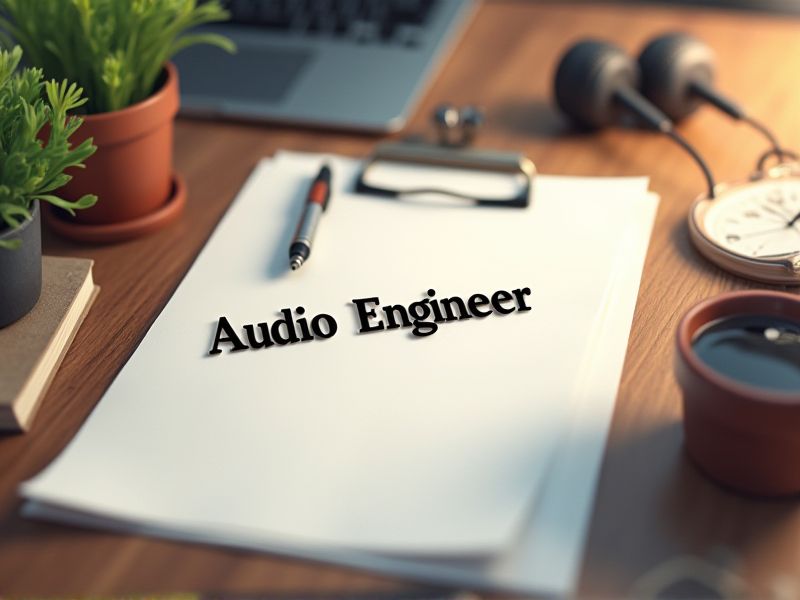
Audio engineers operate complex equipment and software, and certain certifications demonstrate their proficiency and technical expertise. These certifications ensure standardization in skills, vital for maintaining quality across diverse audio setups. Employers often require certification as proof of capability to manage cutting-edge technology and troubleshoot effectively. Important certifications you may need for an audio engineer are outlined below.
Avid Pro Tools Certified User
Achieving Avid Pro Tools Certified User status demonstrates an audio engineer's proficiency with the industry-standard DAW, crucial for efficient workflow handling. Certification validates the engineer's ability to navigate complex projects, positively impacting productivity. It often serves as a differentiator in the job market, increasing employability prospects. Many studios prefer or require certified individuals to ensure a baseline of technical competence and reliability in their teams.
Avid Pro Tools Certified Operator
An Avid Pro Tools Certified Operator demonstrates proficiency in industry-standard software, enhancing an audio engineer's technical capabilities. Certification provides validation of skills, which is essential for securing competitive roles in professional audio environments. Employers often regard certified operators as more reliable due to their proven ability to use Pro Tools efficiently. This certification also opens up opportunities for more advanced projects, facilitating professional growth.
Apple Certified Logic Pro X Professional
Holding an Apple Certified Logic Pro X Professional certification validates an audio engineer's expertise in using Logic Pro X, an industry-standard digital audio workstation. This certification indicates mastery in audio production, enabling engineers to optimize workflows and produce high-quality sound more efficiently. Employers often seek certified professionals to ensure they have the technical skills necessary to handle complex audio projects. Certified engineers can also leverage their credentials to command higher rates and secure more opportunities within competitive music production environments.
Ableton Live Certification
Obtaining Ableton Live Certification ensures an audio engineer has a comprehensive understanding of the software, which leads to more efficient workflow in music production. Employers often prefer certified professionals because they demonstrate a verified level of expertise, enhancing job prospects. Certified engineers might experience increased client trust and credibility, which can lead to more project opportunities. Access to an exclusive community of certified users provides networking possibilities and insights into advanced techniques and industry trends.
Steinberg Cubase Pro Certification
Achieving Steinberg Cubase Pro Certification can enhance an audio engineer's credibility by demonstrating expert proficiency in a widely used digital audio workstation. This certification provides official validation of skills, making candidates more appealing to prospective employers and clients. It ensures familiarity with advanced features and techniques, enabling engineers to fully utilize Cubase's potential in music production. Ultimately, having the certification may lead to better job opportunities and career advancement in the competitive audio industry.
Yamaha Digital Audio Workstation Certification
Yamaha Digital Audio Workstation Certification provides audio engineers with verified skills on Yamaha equipment, improving their credibility in the industry. Possessing the certification leads to increased job opportunities, as employers often prefer candidates with recognized qualifications. Knowledge gained through this certification enhances the engineer's ability to optimize sound quality, impacting the overall production value. Certified individuals stay updated on the latest Yamaha technology, ensuring they remain competitive and informed in the rapidly evolving audio industry.
Waves Audio Mastering Certification
Waves Audio Mastering Certification equips audio engineers with specialized skills to enhance the quality of their work through professional mastering techniques. The certification provides industry-recognized validation, increasing an engineer's credibility and employability in the competitive audio sector. Mastering tools and plugins from Waves demand expert knowledge, and the certification ensures proficiency in using these tools effectively. The rapidly evolving audio technology landscape requires engineers to stay updated, and this certification offers ongoing learning opportunities.
Dolby Atmos Production Certification
Dolby Atmos Production Certification is needed because it ensures the audio engineer is adept at creating immersive, three-dimensional soundscapes which are essential for modern media experiences. This certification guarantees the professional's competency in utilizing cutting-edge technology, which enhances audio quality and consumer satisfaction. Being certified can expand an audio engineer's career opportunities, as many studios and production houses specifically seek out professionals proficient in Dolby Atmos. Certification assures clients of a standardized level of skill and production quality, fostering trust and repeat business.
Berklee Online Certificate in Music Production
A Berklee Online Certificate in Music Production equips an audio engineer with advanced technical skills and industry-standard knowledge, enhancing their ability to produce high-quality sound. The program provides exposure to cutting-edge production software and tools, crucial for keeping pace with rapid technological advancements in music production. Networking opportunities with industry professionals during the course can lead to significant career advancements and collaborations. Employers often regard formal certification as a testament to an individual's dedication and proficiency in a competitive field, increasing job prospects.
Certified Live Sound Professional (CLSP)
Certified Live Sound Professionals (CLSP) bring advanced technical knowledge that is crucial for optimizing sound quality in live settings. Employers often prefer CLSPs as their certification verifies a standard of expertise, reducing the risk of technical errors during events. For audio engineers, holding a CLSP can enhance career prospects and demonstrate a commitment to continuing education. Moreover, the certification ensures familiarity with the latest audio technology and industry trends, benefiting both clients and employers.
Summary
When you obtain certifications in audio engineering, your professional credibility and technical skills will significantly enhance, making you more attractive to potential employers. Acquiring certifications often leads to increased job opportunities and the potential for higher earnings due to recognized expertise. Your network expands as you connect with industry professionals through certification programs, fostering career growth. These validations of skill and knowledge can propel your career forward, opening avenues in diverse audio-related fields.
